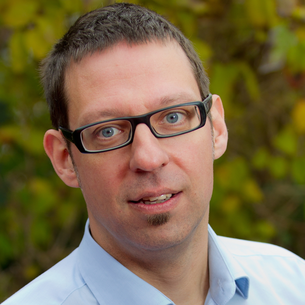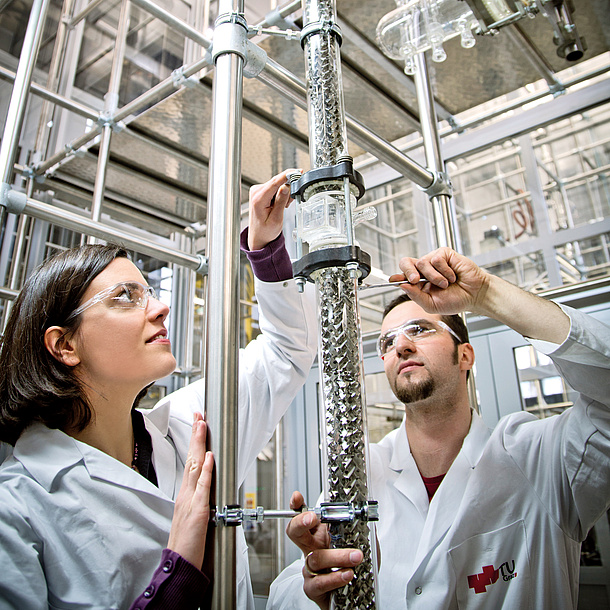- Duration of study: 4 semesters
- ECTS credit points: 120
- Academic degree: "Diplom-Ingenieurin" or "Diplom-Ingenieur" ("Dipl.-Ing." or "DI"), equivalent to the Master of Science (MSc)
- Language of instruction: English
The Master's Programme
The English-language Master’s degree programme broadly addresses all industrial-scale types of material transformations through mechanical, thermal, chemical or biotechnological processes. The programme’s content is therefore highly interdisciplinary, with engineering subjects complementing a broad business education and a focus on the practical applicability of the acquired knowledge.
Students engage both in theory and practice with current industrial topics:
- They become familiar with the latest theories, principles and methods of chemical and process engineering as well as related engineering sciences.
- They learn to consider ecological, economic and legal aspects related to chemical and process engineering.
- They study, among other topics, industrial separation processes, biorefinery processes, particle process engineering, applied analytics and industrial environmental protection.
- They develop plant concepts for various industrial sectors.
The curriculum is subdivided into compulsory, specialisation and elective modules. In the compulsory modules, students acquire comprehensive knowledge in:
- Chemical and Process Engineering Advanced Fundamentals: thermal and chemical separation processes, particle technology, plant and process design
- Business Economics: fundamentals of business administration, investment and finance
- Design Exercise: development of a complete plant concept, from design to profitability analysis
Starting in the first semester, students must also choose one of two specialisations:
- Plant and Process Technology: design, simulation, operation and optimisation of industrial plants and processes
- Bio-based Materials and Paper Technology: bio-based materials, paper and pulp technology, sustainable materials and process development
In addition, students can choose from a wide range of elective modules to set their individual subject focus based on their interests and career goals:
- Green Engineering and Energy: In-depth study of sustainable technologies, such as renewable energies, hydrogen technologies, fuel cells and green process development. Focus on energy-efficient and environmentally friendly processes.
- Bio-based Materials and Paper Technology: Focus on the processing and refinement of bio-based raw materials, biorefinery processes and sustainable technologies for paper and pulp production.
- Pharmaceutical Engineering and Biotechnology: In-depth study of pharmaceutical process engineering, development and optimisation of pharmaceutical production processes, and bioprocess technology.
- Environmental and Process Technology: In-depth study of technologies and processes for exhaust gas purification, wastewater treatment, sustainable environmental protection and optimisation of chemical processes from an ecological perspective.

The large number of electives offered in the Master's programme allow students to pursue their individual interests and explore various aspects of chemical and process engineering. A chemical and process engineer’s career field is correspondingly versatile and offers a lot of room for innovation. Industrial environmental protection will play an especially large role in the future, and this is what led me to choose this degree programme.

I’ve always been a curious person. I’ve always been fascinated by how things work and how processes occur. Chemical and Process Engineering offers the best foundation for satisfying this curiosity and gives me the opportunity to use the knowledge I gain to help shape and optimise processes sustainably.
Aspects of engineering and the natural sciences are optimally combined, opening up a wide range of career opportunities for our graduates.

Chemical and process engineering will be needed to solve many of the challenges society will face in the next decades. These range from creating production processes for new, ecologically sustainable materials to the development of closed-loop processes for materials and goods and on to integrated energy use and storage.
During their studies, students have access to TU Graz’s first-class research infrastructure.
This includes the opportunity to work and conduct research at various pilot plants, such as the RCPE (Research Center Pharmaceutical Engineering), the CEET pilot plant (Institute of Chemical and Environmental Engineering), the pulp laboratory of the BPTI (Institute of Bioproducts and Paper Technology) and the the CEET fuel cell and hydrogen laboratory.
Admission
The prerequisite for admission is a completed bachelor’s degree in a relevant subject (see curriculum).
Additionally, you need to provide evidence of competence in the English language.
Admission Requirements
Graduates of the Bachelor's Programme Chemical and Process Engineering at TU Graz are admitted without needing to fulfil further requirements.
Graduates of other Austrian universities can apply for admission.
Graduates of other foreign universities can obtain information and apply for admission by contacting study@tugraz.at.
Admission without admission procedure
Graduates of the Bachelor’s degree programme Chemical and Process Engineering at TU Graz as well as students, who have already been admitted to the Master's programme Chemical and Process Engineering at TU Graz will be accepted without an admission procedure.
Graduates of other programmes offered at TU Graz can apply for admission at the Registrar's Office.
Admission with admission procedure
Graduates of a previous study programme not mentioned above undergo an admission procedure.
Registration for the academic year 2027/28: 15 October to 15 December 2026
You can complete the admission procedure before the end of your bachelor’s studies.
- Admission and deadlines for Austrian students who are beginning their studies at TU Graz for the first time
- Admission and deadlines for international students
- If you are or were already admitted to a degree programme at TU Graz, please come to the TU Graz Registrar’s Office in person during the admission period or contact study@tugraz.at.
Contact study@tugraz.at
Career Prospects
Graduates of the Master’s Degree Programme Chemical and Process Engineering are able to plan, design and optimise plants for industrial production. Whether as a generalist paying attention to a wide variety of aspects or as a specialist and expert in specialised subject areas, they are in high demand nationally and internationally in many industries, including:
- Chemical industry
- Plant engineering
- Pharmaceutical industry
- Paper and pulp industry
- Biotechnology and bio-based industries
- Food and beverage industry
- Energy and environmental technology
- Fuel cell and power plant technology
- Electronics industry
Typical fields of work include research and development, process planning and optimisation, operations and management, as well as consulting.
The programme also qualifies graduate for further doctoral studies and a career in academia and research.

Chemical and Process Engineering is a degree programme that emphasizes versatility. Although basic principles are also taught at an upper academic level, chemic and process engineers can make decisive contributions to almost all areas of industry and society. This can be in environmental protection, automotive engineering, microelectronics, chemistry, battery research, or pharmacy – chemical and process engineers are important and in demand everywhere.

I can recommend chemical and process engineering to anyone who likes to spice up their professional life with a little variety. The great thing about it is how many different career options it gives you. You can work directly at the production site, in research, or in the area of simulation and programming.
Acquire AI skills: AIE Extension Programme
Increase your career prospects with the Artificial Intelligence Engineering (AIE) extension programme and learn essential skills in AI development and application during or after completing your Master's degree.



